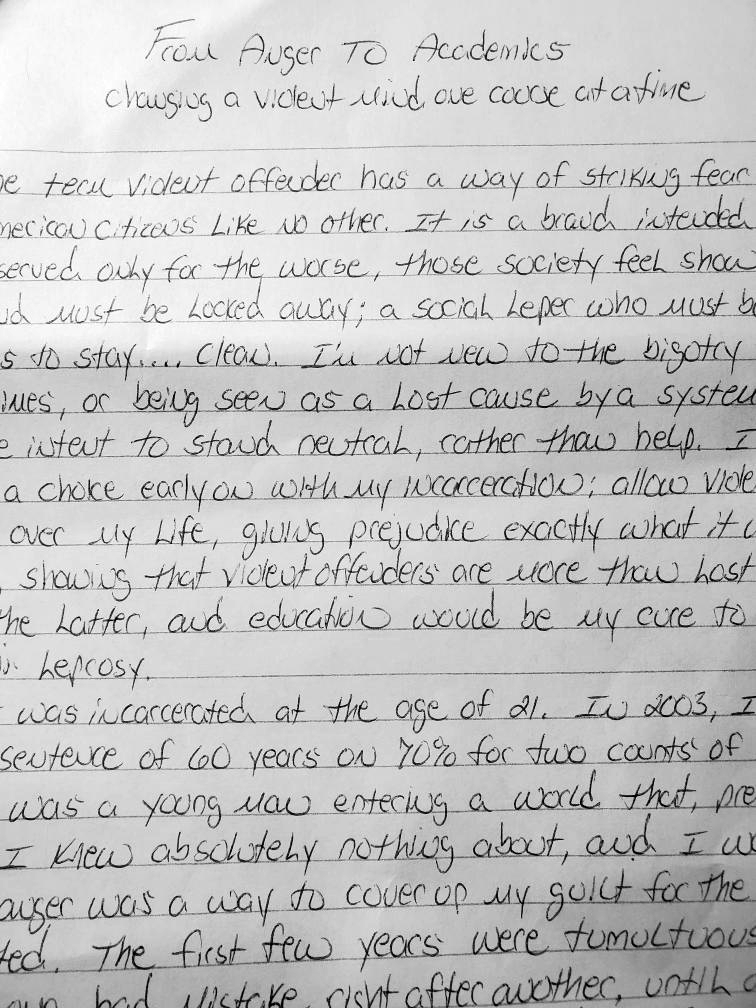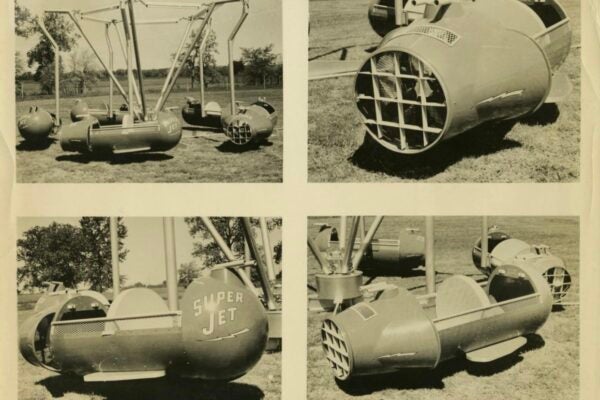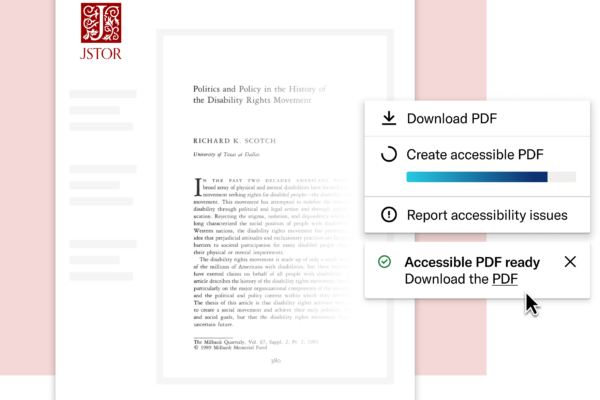
Preface
I came across your magazine through EDOVO. It seems over the last several years college has become very popular. I started coursework around 2007 and I was considered the oddball because I felt so deeply about education. Now, it seems college is just as popular as crime, and I’m thankful for that. I’m also thankful for the chance to write about my experiences and how education gave me a second chance. Whether it is published or not, the opportunity to write is something I’ve never thought much about until people like you express so much concern for people like me. I try to be careful when talking about my masters because I don’t want to come off as arrogant, but the road to achieving this helped me in ways a 1000 word essay couldn’t express. And I’m thankful for the chance; the opportunity to achieve not only a degree, but a second chance.
Wesley M. Withers
Varner Unit
Corcidy, AR
“Now, it seems college is just as popular as crime, and I’m thankful for that.”
The term violent offender has a way of striking fear into the hearts of American citizens like no other. It is a brand intended to scar for life, reserved only for the worse. Those society feels show irredeemable qualities, and must be locked away; a social leper who must be discarded if such society is to stay… clean. I’m not new to the bigotry that comes with my crimes, or being seen as a lost cause by a system that seems more intent to stand neutral, rather than help. I was faced with a choice early on with my incarceration: allow violence dominance over my life, giving prejudice exactly what it wanted, or change, showing that violent offenders are more than lost causes. I chose the latter, and education would be my cure to cleanse me of this leprosy.
“I was faced with a choice early on with my incarceration: allow violence dominance over my life, giving prejudice exactly what it wanted, or change, showing that violent offenders are more than lost causes. I chose the latter, and education would be my cure to cleanse me of this leprosy.”
I was incarcerated at the age of 21. In 2003, I started serving a sentence of 60 years on 70% for two counts of first degree murder. I was a young man entering a world that, previous to my crimes, I knew absolutely nothing about, and I was very angry. The anger was a way to cover up my guilt for the crimes I had committed. The first few years were tumultuous to say the least; one bad mistake right after another, until one day I was given an opportunity to turn my disorderly life into order.
The envelope came to me one evening mail call. I had received numerous advertisements before this, but this one was really interesting. It was from a distant education program offering correspondence courses without the need for a computer. After spending some time flipping through the small brochure, I found a course that spiked my interest, and with the blessing of my family (and their financial support), I signed up for my first correspondence course, and would graduate from Penn Foster Career Institute nine months later, receiving a vocational diploma. It was my first step towards higher education, and I would be hooked, completing one more course from Penn Foster, and three courses from Cleveland institute of Electronics within a five year span.
The courses gave me purpose, and with each completed lesson, it felt I was leaving violence behind; As if intelligence was overpowering the violent nature I had struggled years with. My mind began to contemplate accepting responsibility for my crimes rather than excuses, and as a result, my anger began to fade; Replaced by empathy for my victims family and the need to reconcile. The more knowledge I acquired, the less violent I felt.
“The courses gave me purpose, and with each completed lesson, it felt I was leaving violence behind; As if intelligence was overpowering the violent nature I had struggled years with.”
The college experience was an option for me after school. I just chose not to go, and that mistake followed me through prison. I wanted to experience college, but circumstances in prison dictated my opportunities, and with the second chance Pell grant still years away, my options were very limited, but the desire within me was too great to give up. After searching for a few years I finally came across a college that would give me the chance I was looking for; An opportunity to further my education with a graduate level degree, finding an opportunistic way for College in an inopportune environment.
International Christian college and Seminary was fairly new to the education scene, but specifically catered to inmates: affordable tuition with low monthly payments, easy access to textbooks, straightforward coursework that fluctuated to fit the inmate needs, and quick responses through snail mail. I’m not sure what the experience would have been like after high school, but the day I began my first course work towards a bachelor degree was a huge moment in my life period up to this point who I was- or supposed to be- had been defined by my crimes, yet now, i was walking down a path that would not only change fundamentally how i acted, but give me back a measure of humanity.
“[U]p to this point who I was- or supposed to be- had been defined by my crimes, yet now, i was walking down a path that would not only change fundamentally how i acted, but give me back a measure of humanity.”
After receiving my bachelor degree, I felt a lot of pride in what I had accomplished, and although I was still branded a violent offender, I did not feel as if I had to conform to that identity any more; I was now free to choose who I wanted to be, not how others saw me. The basic fundamentals of my life had changed: the anger subsided, replaced with a more logical approach to tense situations; Bitterness replaced with humbleness. I began to see prison as an opportunity to fix what was broken inside of me, and not just punishment.
“After receiving my bachelor degree, I felt a lot of pride in what I had accomplished, and although I was still branded a violent offender, I did not feel as if I had to conform to that identity any more; I was now free to choose who I wanted to be, not how others saw me.”
The bachelor degree wasn’t enough though. I enjoyed the coursework, the exercising of my mind, and I guess you could say demons. The courses helped me reconcile with myself. I know that may seem difficult for many to accept, but the more intelligent I became, the more I despised the ignorance within me. So after careful consideration, i applied for the Master of theological studies, and after several years of hard work, sacrifice, and determination, I received my Masters. The greatest achievement of my life. I am currently enrolled in the doctor of theology program, which I hope to complete in two years. The shift from violence to enlightened is not easy, especially for those who have dealt with violence for the majority of their lives. It starts with a thought, a whisper to the conscience, barely audible but they’re nonetheless. The louder it gets, the more attention you have to pay it, until the whisper becomes a scream, and what started out as a small step in the right direction, quickly becomes a way of life. Walking the straight and narrow is difficult, especially in a place with such wide paths, but there are those like me walking it, an education is the key to that first step.
“The shift from violence to enlightened is not easy, especially for those who have dealt with violence for the majority of their lives. It starts with a thought, a whisper to the conscience, barely audible but they’re nonetheless. The louder it gets, the more attention you have to pay it, until the whisper becomes a scream, and what started out as a small step in the right direction, quickly becomes a way of life.”
Editor’s note
This submission lingered in my mind for quite some time. I was particularly eager to understand Wesley’s preferred terminology. At first, I was a bit frustrated and set the submission aside because it didn’t provide a clear answer. However, as I took a break and watched The Neverending Story (the classic 1984 version), I couldn’t help but draw a parallel to Wesley’s essay during a pivotal moment in the film where Bastian hesitates to say the chosen name that could save Fantasia. Of course, the situation with Wesley’s essay wasn’t nearly as dramatic. By that point, I had reviewed over 100 essays, and I noticed a common preference: most contributors simply wanted to be called by their names. Collectively, they tended to favor “prisoner” over “inmate,” while “offender” was consistently disliked. The label Wesley chose ultimately didn’t affect the profound impact of his narrative. From the opening lines, I could sense the burden of external judgments he bore, which shifted remarkably once he embraced his identity as a student. I chose to publish his essay first because it transformed my perspective, urging me to listen more attentively to the authors. It also serves as a reminder that we should not expect tidy resolutions to complex societal dilemmas from these intimate narratives. In a year or so, we’ll likely be referring to him as Dr. Wesley M. Withers. My deepest thanks to Wesley!
For more on the “Second chance mentality: First chance reality” essay series for JSTOR Access in Prison, check out Senior Manager of JSTOR Access in Prison Stacy Burnett’s introductory post here.
For more information on the JSTOR Access in Prison initiative, head over to the program page here.



